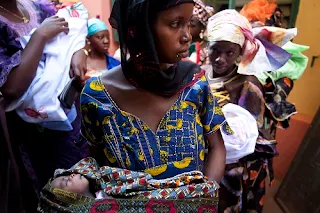Death by Measles in South Sudan
The anti-vaccine movement in South Sudan, Africa, is by force, not choice. Measles is one of the leading causes of death among young children even though a safe and cost-effective vaccine is available.

|
| Measles outbreak Africa mothers wait to vaccinate their babies |
Death by Measles in South Sudan
South Sudan is being wracked by severe humanitarian health emergencies. The destruction of health facilities and displacement of health workers have stretched an already vulnerable health system to breaking point. Despite being preventable, measles is still common in many parts of South Sudan Africa.
Measles is an extremely infectious disease caused by the rubeola virus. In 1980, before widespread vaccination, measles caused an estimated 2.6 million deaths each year worldwide. Measles starts with fever, runny nose, cough, red eyes, and sore throat followed by a rash that spreads over the entire body.
In February 2014, WHO categorized South Sudan’s health crisis as a “Grade 3” – the highest level of humanitarian emergency. More than 3500 cases, and 170 deaths were reported in 2015. Almost all were recorded in displaced people’s camps or refugee camps. Measles is one of the leading causes of death among young children throughout Africa even though a safe and cost-effective vaccine is available.
"South Sudan is a challenging work environment because of insecurity and a limited ability to access some of the country’s most vulnerable people," said Dr Abdulmumini Usman, WHO Representative to South Sudan.

|
| Almost all Measles cases were recorded in displaced people’s camps or refugee camps in South Sudan 2015. |
Most measles-related deaths are caused by complications associated with the disease. Complications are more common in children under the age of 5, or adults over the age of 20. The most serious complications include blindness, encephalitis (an infection that causes brain swelling), severe diarrhea and related dehydration, ear infections, or severe respiratory infections such as pneumonia. Severe measles is more likely among poorly nourished young children, especially those with insufficient vitamin A, or whose immune systems have been weakened by HIV/AIDS or other diseases.
In the U.S., many parents started refusing to vaccinate their children from the measles and decide to raise their children without vaccines. In 2015 officials in 14 states grappled to contain a spreading measles outbreak that began near California’s Disneyland. The anti-vaccine movement can largely be traced to a 1998 report in a medical journal that suggested a link between vaccines and autism but was later proved fraudulent and retracted. Throughout South Sudan, infectious diseases such as measles pose a major public health challenge and cause significant levels of illness, disability and death for a country also caught in conflict. The country’s weak public health systems aggravate the situation to effectively respond to largely preventable disease outbreaks.

|
| Child given an oral polio vaccine in South Sudan |
Armed conflicts seriously affect health services and the environment. Health staff is reduced because of flight, death or conscription in the military. Health care infrastructure, medical supplies, equipment, sanitation, and water supplies are often destroyed.
Delivery of health services, especially preventive immunization such as the measles vaccine and mother and childcare are obstructed. At the same time, displacements, war trauma and physical injuries increase people's needs for health services and medical care.
The almost complete absence of health services worsens the situation of families whose living conditions, food supply, and consumption are inadequate; consequently, a vicious complex of malnutrition and poor resistance to infectious diseases is initiated.
Measles is a highly contagious infectious disease and large-scale population movements and the concentration of people in transit camps further aggravate the risk of susceptibility to infection. Overcrowding and lack of adequate sanitation and water supplies in camps can lead to the rapid spread of measles.
Mass measles immunization campaigns in South Sudan
Due to insecurity, the population of entire villages fled overnight and staff of non-governmental organizations were evacuated, leaving no access to basic services. In March 2014, to reach internally displaced people and those most affected by the ongoing conflict with lifesaving humanitarian assistance, and to re-open humanitarian space, the World Food Programme (WFP) and the United Nations Children's Fund (UNICEF) initiated an Integrated Rapid Response Mechanism (IRRM).
This was designed to address critical gaps in the provision of lifesaving humanitarian coverage and to meet the needs of those who might otherwise be inaccessible by responding to the rapidly changing environment on the ground.
By 2016, using general food distribution registration as a platform for beneficiary identification, WFP, and UNICEF had jointly deployed more than 90 joint IRRM missions, mostly in the Greater Upper Nile region.
In 2017, the UNICEF health section participated in IRRM missions providing preventive and curative health services and supporting local partners through mass immunization campaigns single dose of oral poliomyelitis vaccine, measles, tetanus toxoid mobilization of the communities during general food distribution registration.
Over 1.4 million people in hard-to-reach and isolated areas of South Sudan were given lifesaving food and nutrition rations, paired with other critical services. The mass immunization campaign results were:
· 92,900 children 6 months–15 years immunized against measles
·109,800 children 0–15 years immunized against polio
· 17,300 pregnant women provided with tetanus toxoid vaccine
· 28,800 therapeutic consultations
·43,300 mosquito nets distributed

|
| Mass immunization campaigns in South Sudan |
Together we build awareness that boost harmony, education, and success, below are more links to articles you will find thought provoking.
- Historical African Country Name
- Top 20 Largest Countries in Africa
- How many countries does Africa have?
- Roots of Africanized Christianity Spiritual Songs
- Chocolate Processing Facts History and Recipes
- Awesome Kenyan Woman
- Land is Not For Women in Sierra Leone
- African Kente Cloth Facts
- Accra the Ghanaian Capital Ultimate Mall Experience






